Unit 2 presenting ideas测试题 新外研必修一 (含答案与解析)
文档属性
| 名称 | Unit 2 presenting ideas测试题 新外研必修一 (含答案与解析) | 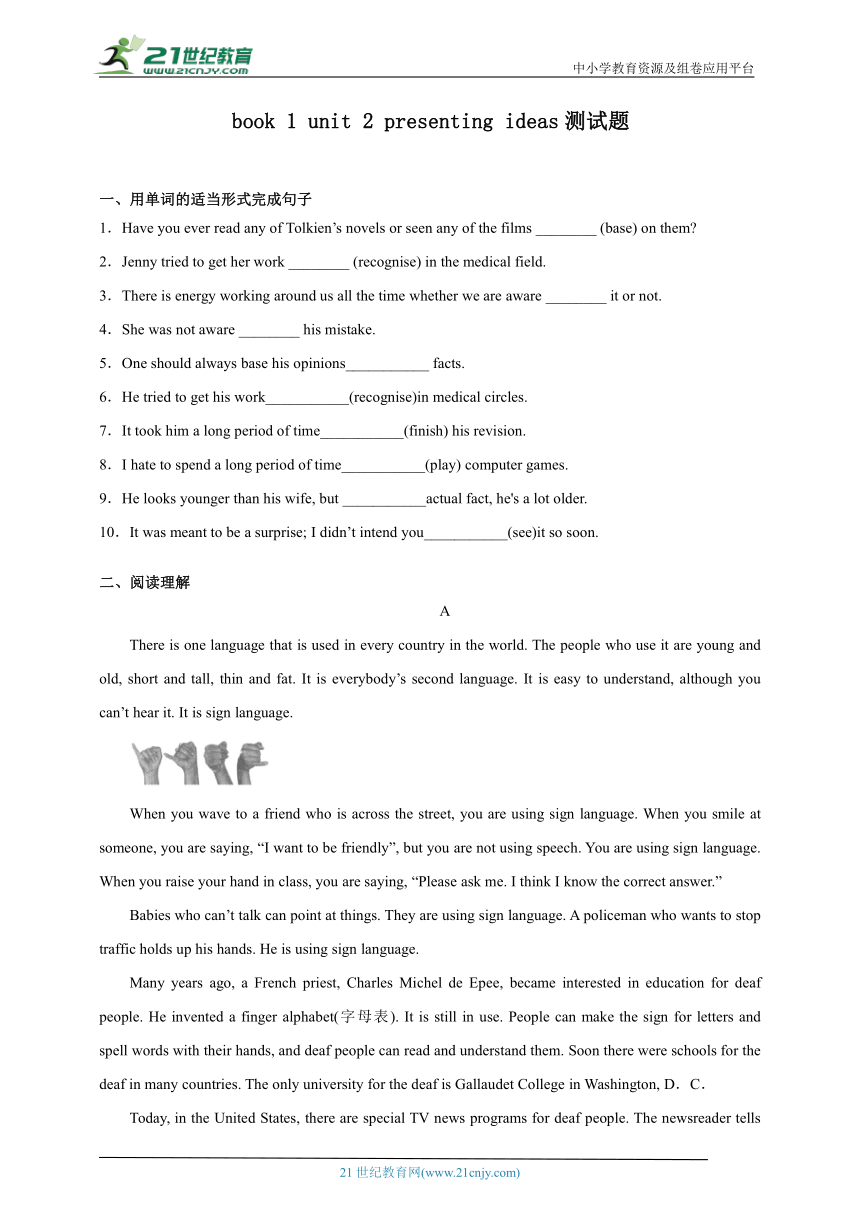 | |
| 格式 | doc | ||
| 文件大小 | 312.7KB | ||
| 资源类型 | 试卷 | ||
| 版本资源 | 外研版(2019) | ||
| 科目 | 英语 | ||
| 更新时间 | 2023-08-04 13:28:58 | ||
图片预览

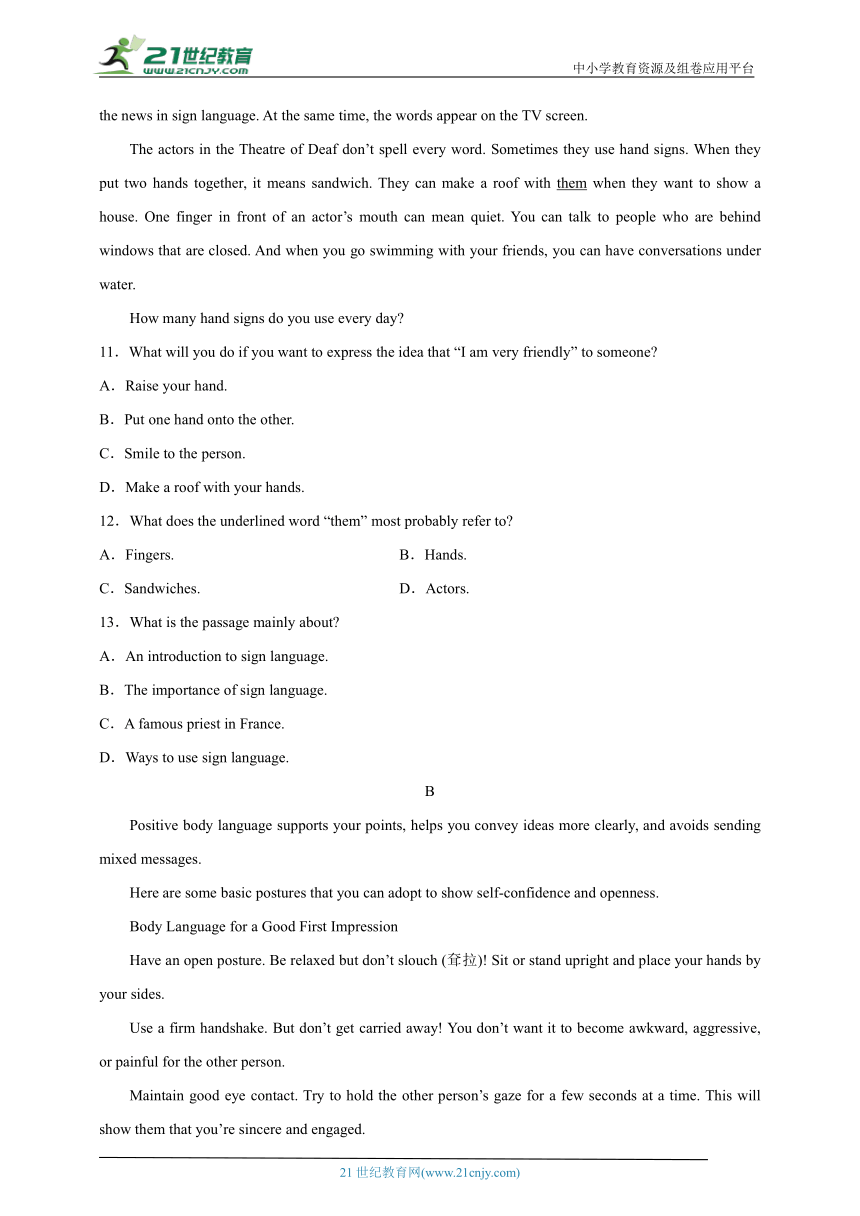
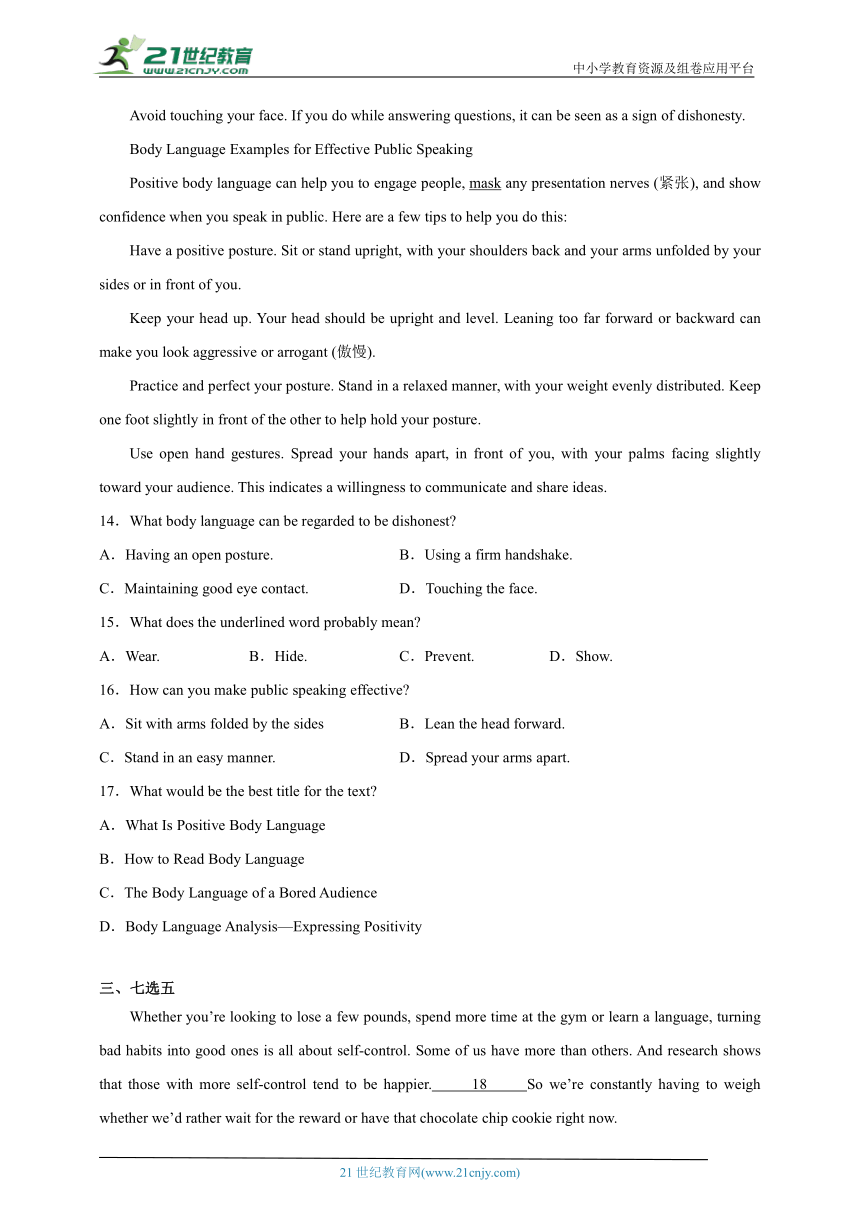
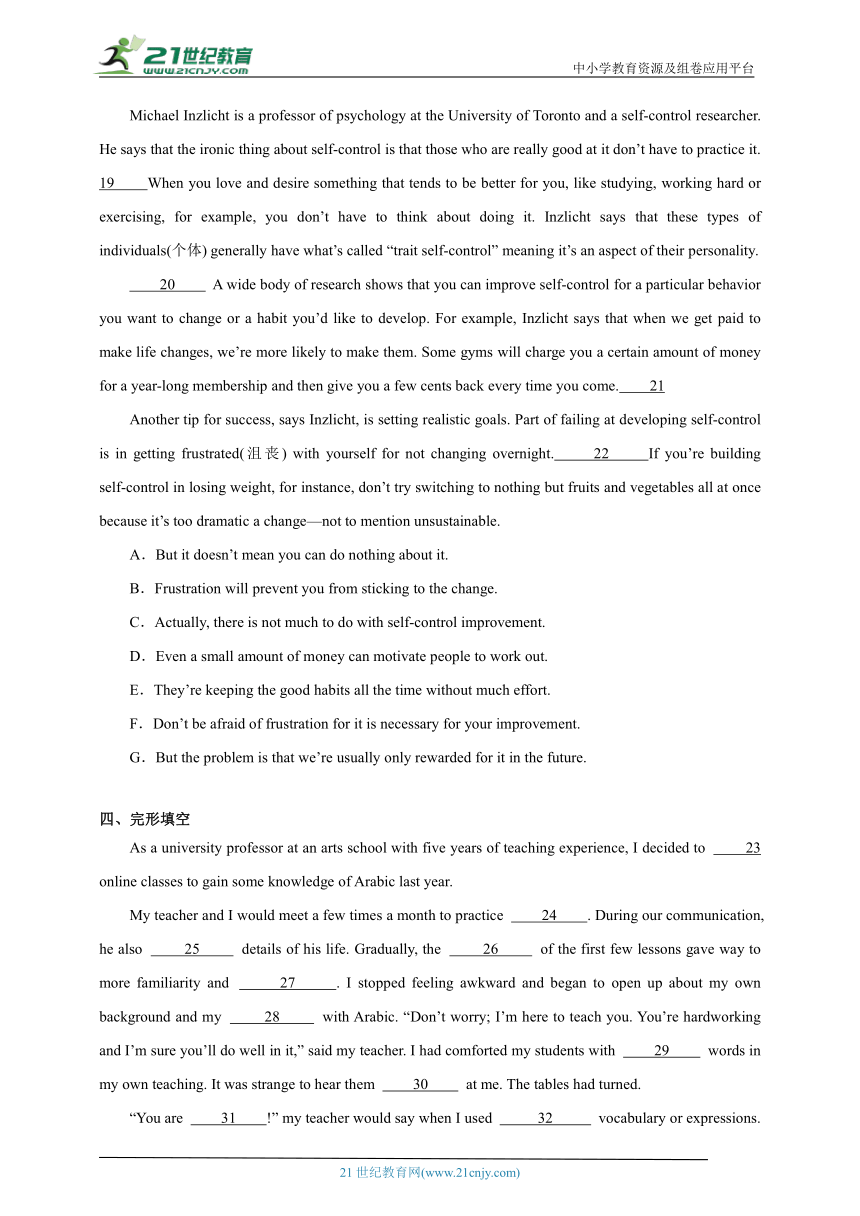
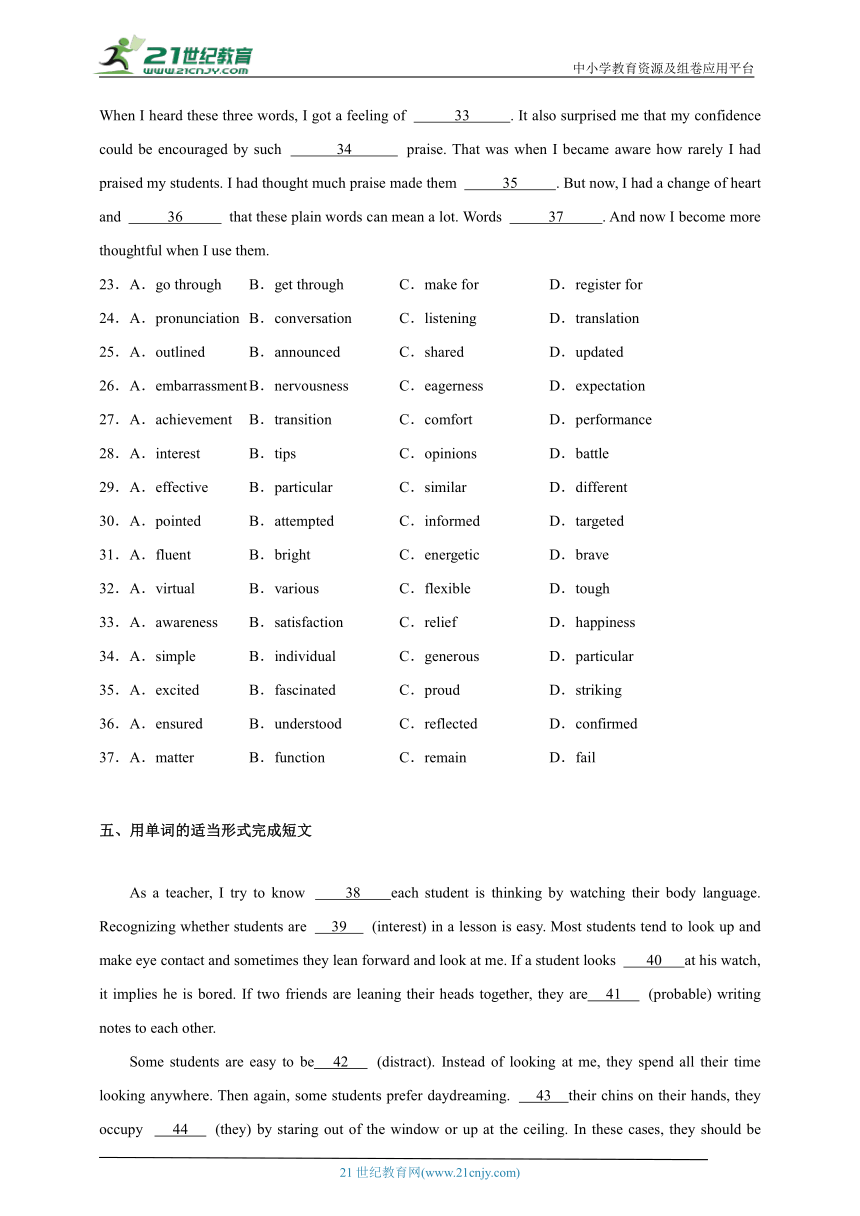
文档简介
中小学教育资源及组卷应用平台
book 1 unit 2 presenting ideas测试题
一、用单词的适当形式完成句子
1.Have you ever read any of Tolkien’s novels or seen any of the films ________ (base) on them
2.Jenny tried to get her work ________ (recognise) in the medical field.
3.There is energy working around us all the time whether we are aware ________ it or not.
4.She was not aware ________ his mistake.
5.One should always base his opinions___________ facts.
6.He tried to get his work___________(recognise)in medical circles.
7.It took him a long period of time___________(finish) his revision.
8.I hate to spend a long period of time___________(play) computer games.
9.He looks younger than his wife, but ___________actual fact, he's a lot older.
10.It was meant to be a surprise; I didn’t intend you___________(see)it so soon.
二、阅读理解
A
There is one language that is used in every country in the world. The people who use it are young and old, short and tall, thin and fat. It is everybody’s second language. It is easy to understand, although you can’t hear it. It is sign language.
When you wave to a friend who is across the street, you are using sign language. When you smile at someone, you are saying, “I want to be friendly”, but you are not using speech. You are using sign language. When you raise your hand in class, you are saying, “Please ask me. I think I know the correct answer.”
Babies who can’t talk can point at things. They are using sign language. A policeman who wants to stop traffic holds up his hands. He is using sign language.
Many years ago, a French priest, Charles Michel de Epee, became interested in education for deaf people. He invented a finger alphabet(字母表). It is still in use. People can make the sign for letters and spell words with their hands, and deaf people can read and understand them. Soon there were schools for the deaf in many countries. The only university for the deaf is Gallaudet College in Washington, D.C.
Today, in the United States, there are special TV news programs for deaf people. The newsreader tells the news in sign language. At the same time, the words appear on the TV screen.
The actors in the Theatre of Deaf don’t spell every word. Sometimes they use hand signs. When they put two hands together, it means sandwich. They can make a roof with them when they want to show a house. One finger in front of an actor’s mouth can mean quiet. You can talk to people who are behind windows that are closed. And when you go swimming with your friends, you can have conversations under water.
How many hand signs do you use every day
11.What will you do if you want to express the idea that “I am very friendly” to someone
A.Raise your hand.
B.Put one hand onto the other.
C.Smile to the person.
D.Make a roof with your hands.
12.What does the underlined word “them” most probably refer to
A.Fingers. B.Hands.
C.Sandwiches. D.Actors.
13.What is the passage mainly about
A.An introduction to sign language.
B.The importance of sign language.
C.A famous priest in France.
D.Ways to use sign language.
B
Positive body language supports your points, helps you convey ideas more clearly, and avoids sending mixed messages.
Here are some basic postures that you can adopt to show self-confidence and openness.
Body Language for a Good First Impression
Have an open posture. Be relaxed but don’t slouch (耷拉)! Sit or stand upright and place your hands by your sides.
Use a firm handshake. But don’t get carried away! You don’t want it to become awkward, aggressive, or painful for the other person.
Maintain good eye contact. Try to hold the other person’s gaze for a few seconds at a time. This will show them that you’re sincere and engaged.
Avoid touching your face. If you do while answering questions, it can be seen as a sign of dishonesty.
Body Language Examples for Effective Public Speaking
Positive body language can help you to engage people, mask any presentation nerves (紧张), and show confidence when you speak in public. Here are a few tips to help you do this:
Have a positive posture. Sit or stand upright, with your shoulders back and your arms unfolded by your sides or in front of you.
Keep your head up. Your head should be upright and level. Leaning too far forward or backward can make you look aggressive or arrogant (傲慢).
Practice and perfect your posture. Stand in a relaxed manner, with your weight evenly distributed. Keep one foot slightly in front of the other to help hold your posture.
Use open hand gestures. Spread your hands apart, in front of you, with your palms facing slightly toward your audience. This indicates a willingness to communicate and share ideas.
14.What body language can be regarded to be dishonest
A.Having an open posture. B.Using a firm handshake.
C.Maintaining good eye contact. D.Touching the face.
15.What does the underlined word probably mean
A.Wear. B.Hide. C.Prevent. D.Show.
16.How can you make public speaking effective
A.Sit with arms folded by the sides B.Lean the head forward.
C.Stand in an easy manner. D.Spread your arms apart.
17.What would be the best title for the text
A.What Is Positive Body Language
B.How to Read Body Language
C.The Body Language of a Bored Audience
D.Body Language Analysis—Expressing Positivity
三、七选五
Whether you’re looking to lose a few pounds, spend more time at the gym or learn a language, turning bad habits into good ones is all about self-control. Some of us have more than others. And research shows that those with more self-control tend to be happier. 18 So we’re constantly having to weigh whether we’d rather wait for the reward or have that chocolate chip cookie right now.
Michael Inzlicht is a professor of psychology at the University of Toronto and a self-control researcher. He says that the ironic thing about self-control is that those who are really good at it don’t have to practice it. 19 When you love and desire something that tends to be better for you, like studying, working hard or exercising, for example, you don’t have to think about doing it. Inzlicht says that these types of individuals(个体) generally have what’s called “trait self-control” meaning it’s an aspect of their personality.
20 A wide body of research shows that you can improve self-control for a particular behavior you want to change or a habit you’d like to develop. For example, Inzlicht says that when we get paid to make life changes, we’re more likely to make them. Some gyms will charge you a certain amount of money for a year-long membership and then give you a few cents back every time you come. 21
Another tip for success, says Inzlicht, is setting realistic goals. Part of failing at developing self-control is in getting frustrated(沮丧) with yourself for not changing overnight. 22 If you’re building self-control in losing weight, for instance, don’t try switching to nothing but fruits and vegetables all at once because it’s too dramatic a change—not to mention unsustainable.
A.But it doesn’t mean you can do nothing about it.
B.Frustration will prevent you from sticking to the change.
C.Actually, there is not much to do with self-control improvement.
D.Even a small amount of money can motivate people to work out.
E.They’re keeping the good habits all the time without much effort.
F.Don’t be afraid of frustration for it is necessary for your improvement.
G.But the problem is that we’re usually only rewarded for it in the future.
四、完形填空
As a university professor at an arts school with five years of teaching experience, I decided to 23 online classes to gain some knowledge of Arabic last year.
My teacher and I would meet a few times a month to practice 24 . During our communication, he also 25 details of his life. Gradually, the 26 of the first few lessons gave way to more familiarity and 27 . I stopped feeling awkward and began to open up about my own background and my 28 with Arabic. “Don’t worry; I’m here to teach you. You’re hardworking and I’m sure you’ll do well in it,” said my teacher. I had comforted my students with 29 words in my own teaching. It was strange to hear them 30 at me. The tables had turned.
“You are 31 !” my teacher would say when I used 32 vocabulary or expressions. When I heard these three words, I got a feeling of 33 . It also surprised me that my confidence could be encouraged by such 34 praise. That was when I became aware how rarely I had praised my students. I had thought much praise made them 35 . But now, I had a change of heart and 36 that these plain words can mean a lot. Words 37 . And now I become more thoughtful when I use them.
23.A.go through B.get through C.make for D.register for
24.A.pronunciation B.conversation C.listening D.translation
25.A.outlined B.announced C.shared D.updated
26.A.embarrassment B.nervousness C.eagerness D.expectation
27.A.achievement B.transition C.comfort D.performance
28.A.interest B.tips C.opinions D.battle
29.A.effective B.particular C.similar D.different
30.A.pointed B.attempted C.informed D.targeted
31.A.fluent B.bright C.energetic D.brave
32.A.virtual B.various C.flexible D.tough
33.A.awareness B.satisfaction C.relief D.happiness
34.A.simple B.individual C.generous D.particular
35.A.excited B.fascinated C.proud D.striking
36.A.ensured B.understood C.reflected D.confirmed
37.A.matter B.function C.remain D.fail
五、用单词的适当形式完成短文
As a teacher, I try to know 38 each student is thinking by watching their body language. Recognizing whether students are 39 (interest) in a lesson is easy. Most students tend to look up and make eye contact and sometimes they lean forward and look at me. If a student looks 40 at his watch, it implies he is bored. If two friends are leaning their heads together, they are 41 (probable) writing notes to each other.
Some students are easy to be 42 (distract). Instead of looking at me, they spend all their time looking anywhere. Then again, some students prefer daydreaming. 43 their chins on their hands, they occupy 44 (they) by staring out of the window or up at the ceiling. In these cases, they should be reminded to concentrate.
Distinguishing when students are troubled is much 45 (hard). If students have their arms crossed in front of their chests and their legs 46 (close) or crossed, it shows they are angry, afraid, or experiencing anxiety.
Finally, it is my duty to help every student to learn. I adjust class 47 (activity) according to students’ body language. In my opinion, reacting to body language is an important component of being a teacher.
参考答案:
1.based
【详解】考查非谓语动词。句意:你读过托尔金的小说吗?或者看过根据他的小说改编的电影吗?分析句子,句中have seen为谓语动词,设空处使用非谓语动词,film与base之间的被动关系,故使用过去分词作后置定语。base意为“以……为基础”,过去分词为based。故填based。
2.recognised
【详解】考查非谓语动词。句意:珍妮试图让她的工作在医学领域得到认可。设空处为非谓语动词,做get的宾语补足语,和宾语之间是被动关系,应用过去分词,故填recognised。
3.of
【详解】考查固定短语。句意:无论我们是否意识到,我们周围一直有能量在做功。分析句子可知,句中涉及固定短语“be aware of…”,意为“意识到……”,故空格处应用介词“of”。故填of。
4.of
【详解】考查介词。句意:她不知道他的错误。结合句意表达“知道”用be aware of。故填of。
5.on/upon
【详解】考查介词。句意:一个人的观点应该总是以事实为依据。base sth. on/upon sth. 是固定短语,意为“以……为基础;把……建立在……基础上”,故填on/upon。
6.recognised
【详解】考查过去分词作宾语补足语。句意:他试图让自己的工作在医学界得到认可。分析句子可知,空格处应填入非谓语动词作宾语补足语。his work与recognise是被动关系,故用过去分词。get sth. done意为“让……被……”,故填recognised。
7.to finish
【详解】考查非谓语动词。句意:他花了很长时间完成他的复习。此处为句型it takes/took sb. some time to do sth.表示“做某事花费某人多少时间”,it是形式主语,不定式是真正的主语。故填to finish。
8.playing
【详解】考查非谓语动词。句意:我讨厌花很长时间玩电脑游戏。此处为短语spend some time doing sth.表示“花费时间做某事”。故填playing。
9.in
【详解】考查介词。句意:他看起来比他妻子年轻,但实际上,他比他妻子老得多。根据句意和空格后的actual fact可知,该题是考查的固定短语in actual fact(实际上)。故填in。
10.to see
【详解】考查动词不定式。这本来是一个惊喜;我没想让你这么快就看到。intend sb to do sth“想让某人作某事”为固定短语,满足句意要求。故填to see。
11.C 12.B 13.A
【导语】本文是一篇说明文,介绍了世界上通用的一种语言——手势语。
11.细节理解题。根据第二段中的“When you smile at someone, you are saying, ‘I want to be friendly’, but you are not using speech.(当你对某人微笑时,你在表示‘我想变得友好’,但你没有说话)”可知,如果你对某个人想表达“我很友好”这种想法,你可以对这个人微笑。故选C。
12.代词指代题。根据上文中的“Sometimes they use hand signs. When they put two hands together, it means sandwich.(有时他们会用手势。当他们把两只手放在一起时,意思是三明治)”可知,可以用手做不同的形状,来表达不同的东西。由此猜测them指代上文提到的hands。故选B。
13.主旨大意题。通读全文可知,本文是“总分总”结构,根据第一段中的“It is everybody’s second language. It is easy to understand, although you can’t hear it. It is sign language.(这是每个人的第二语言。虽然你听不见,但它很容易理解。它是手势语)”和最后一段“How many hand signs do you use every day (你每天用多少手势?)”并结合文章内容可知,本文主要围绕“手势语”展开,介绍了它们在日常生活中的作用、对聋人的作用以及不同手势代表的意义。故选A。
14.D 15.B 16.C 17.D
【导语】本文是一篇说明文。主要介绍了如何使用恰当的肢体语言来给他人留下好印象和进行有效的公开演讲。
14.细节理解题。根据Body Language for a Good First Impression部分“Avoid touching your face. If you do while answering questions, it can be seen as a sign of dishonesty.(避免触摸你的脸。如果你在回答问题时这样做,这可能被视为不诚实的表现)”可知,触摸脸部可能会被认为是不诚实的。故选D。
15.词句猜测题。根据Body Language Examples for Effective Public Speaking部分“Positive body language can help you to engage people, mask any presentation nerves, and show confidence when you speak in public.(积极的肢体语言可以帮助你吸引别人,mask任何表现的紧张情绪,并在公共场合说话时表现出自信)”可知,积极的肢体语言可以帮助你与人互动,在公共场合讲话时表现出自信,由此可推知,积极的肢体语言可以掩饰你公开演讲时的紧张情绪,划线单词mask表示“掩饰,隐藏”,与hide同义。故选B。
16.细节理解题。根据Body Language Examples for Effective Public Speaking部分“Stand in a relaxed manner, with your weight evenly distributed.(以放松的方式站立,使你的体重均匀分布)”可知,以放松的方式站立可以使公开演讲有效。故选C。
17.主旨大意题。根据第一段“Positive body language supports your points, helps you convey ideas more clearly, and avoids sending mixed messages.(积极的肢体语言支撑你的观点,帮助你更清楚地传达想法,避免发出混杂的信息)”、第二段“Here are some basic postures that you can adopt to show self-confidence and openness.(以下是一些你可以用来展示自信和坦率的基本姿势)”以及文章内容可知,本文主要介绍了如何使用恰当的肢体语言来给他人留下好印象和进行有效的公开演讲,所以“肢体语言分析:传递积极信息”可以作为文章标题。故选D。
18.G 19.E 20.A 21.D 22.B
【导语】这是一篇说明文。文章介绍了如何提高自我控制能力。
18.下文“So we’re constantly having to weigh whether we’d rather wait for the reward or have that chocolate chip cookie right now. (所以我们必须不断权衡是等待回报还是现在就吃巧克力饼干。)”说明我们必须不断做出选择,选项G“但问题是,我们通常只会在未来才得到回报。”和下文之间存在因果关系。选项中rewarded和下文中the reward语义相关,故选G项。
19.上文“He says that the ironic thing about self-control is that those who are really good at it don’t have to practice it. (他说,具有讽刺意味的是,那些真正擅长自我控制的人并不需要练习自我控制。)”说明擅长自我控制的人很容易做到自我控制,选项E“他们毫不费力地一直保持着好习惯。”承接上文,说明擅长自我控制的人很容易保持好习惯,They指代的就是those who are really good at it ,故选E项。
20.上文“Inzlicht says that these types of individuals(个体) generally have what’s called “trait self-control” meaning it’s an aspect of their personality. (Inzlicht说,这类人通常具有所谓的‘自我控制特质’,这是他们性格的一个方面。)”说明这些人有自我控制的特质,选项A“但这并不意味着你对此无能为力。”承接上文,转折语义,说明即便你不具备这种性格,也不是没有办法,引出下文“A wide body of research shows that you can improve self-control for a particular behavior you want to change or a habit you’d like to develop. (大量的研究表明,你可以提高你想要改变的特定行为或你想要养成的习惯的自制力。)”说明你也可以提高自己的自我控制能力。故选A项。
21.上文“Some gyms will charge you a certain amount of money for a year-long membership and then give you a few cents back every time you come. (有些健身房会向你收取一年的会员费,然后每次你来都会给你几分钱。)”说明有些健身房会用给几分钱的方式吸引你去锻炼,选项D“即使是少量的钱也能激励人们去锻炼。”承接上文,这样做也能激励人们去锻炼。选项中Even a small amount of money和上文中a few cents语义相关,故选D项。
22.上文“Part of failing at developing self-control is in getting frustrated(沮丧) with yourself for not changing overnight. (发展自我控制失败的部分原因是对自己没有在一夜之间改变而感到沮丧。)”说明可能会因为急于求成导致失败而阻碍自我控制的发展,选项B“挫败感会阻止你坚持改变。”承接上文,说明挫败感会阻碍你坚持改变。语义一致,故选B项。
23.D 24.B 25.C 26.A 27.C 28.D 29.C 30.D 31.B 32.B 33.D 34.A 35.C 36.B 37.A
【导语】本文是一篇记叙文。文章主要讲述了作者身为一名教授在学习阿拉伯语的时候,被自己的老师表扬了,而这些表扬的话语给作者很大的触动。作者由此改变了以前的想法,决定要多多表扬自己的学生。
23.考查动词短语词义辨析。句意:作为一名有五年教学经验的艺术学院的大学教授,我去年决定注册选择在线课程来学习一些阿拉伯语知识。 A. go through经历;B. get through通过,接通电话;C. make for有助于;D. register for注册、选课。根据下文“My teacher and I would meet a few times a month to practice ____2____.”可知,作者是在网上注册选择了阿拉伯语课程学习。故选D。
24.考查名词词义辨析。句意:我和老师每个月都会见面几次练习会话。A. pronunciation发音;B. conversation对话;C. listening听;D. translation翻译。根据下文“During our communication, he also ____3____ details of his life.”中的“communication”可知,作者和老师每个月见面是为了练习会话。故选B。
25.考查动词词义辨析。句意:在我们的交流中,他也分享了他的生活细节。A. outlined概述;B. announced通知;C. shared分享;D. updated更新。根据空后的宾语“details of his life”以及上文“My teacher and I would meet a few times a month to practice ____2____.”可知,作者和老师每个月见面练习会话,所以作者的老师是开始分享日常。故选C。
26.考查名词词义辨析。句意:渐渐地,最初几节课的尴尬被熟悉和舒适所取代。A. embarrassment尴尬;B. nervousness紧张;C. eagerness渴望;D. expectation期待。根据下文“I stopped feeling awkward and began to open up about my own background and my ____6____ with Arabic.”可知,作者最初感到尴尬,空处为同义词替换,选择“embarrassment”代替下文的“feeling awkward”。故选A。
27.考查名词词义辨析。句意:渐渐地,最初几节课的尴尬被熟悉和舒适所取代。A. achievement成就;B. transition转变;C. comfort舒适;D. performance表演、表现。根据空前的and可知,空处和上文的“familiarity”词义相近。故选C。
28.考查名词词义辨析。句意:我不再感到尴尬,开始畅谈自己的背景和我与阿拉伯语的斗争。A. interest兴趣;B. tips建议;C. opinions想法;D. battle斗争。根据下文““Don’t worry; I’m here to teach you. You’re hardworking and I’m sure you’ll do well in it,” said my teacher.”可知,作者的老师是在宽慰作者,让他不要担心阿拉伯语的学习。由此判断,作者是向老师表达了自己学习阿拉伯语的困难,也就是与之作斗争。故选D。
29.考查形容词词义辨析。句意:在我自己的教学中,我也用类似的话安慰过我的学生。A. effective有效的;B. particular挑剔的;C. similar相似的;D. different不同的。根据上文可知,作者本人也是老师;再根据下文“The tables had turned.”可知,当作者听到表扬自己的话时,深有感触,感到局势扭转,由此判断,作者平时也会对自己的学生说类似的话语。故选C。
30.考查动词词义辨析。句意:听到这些话是说给我听的时候,感觉很奇怪。A. pointed指向;B. attempted试图;C. informed通知;D. targeted瞄准。根据上文““Don’t worry; I’m here to teach you. You’re hardworking and I’m sure you’ll do well in it,” said my teacher.”可知,这些话是作者的老师对作者所说的话,由此判断,这些话的目标听众是作者。故选D。
31.考查形容词词义辨析。句意:“你真聪明!”当我使用各种词汇或表达时,我的老师会说。A. fluent流畅的;B. bright明亮的、聪明的;C. energetic充满活力的;D. brave勇敢的。根据下文“my teacher would say when I used ____10____ vocabulary or expressions.”以及文章所提到的关于表扬的话语可知,空处是作者的老师在表扬作者,而且是在作者学会用大量阿拉伯语词汇的时候。故选B。
32.考查形容词词义辨析。句意:“你真聪明!”当我使用各种词汇或表达时,我的老师会说。A. virtual视觉的;B. various各种各样的;C. flexible灵活的;D. tough艰难的。根据上文“You are ____9____!”可知,作者的老师是在表扬作者,由此可以判断,作者是使用了各种各样的词汇。故选B。
33.考查名词词义辨析。句意:当我听到这三个字,我有一种幸福的感觉。A. awareness意识;B. satisfaction满足、满意;C. relief宽慰;D. happiness幸福。根据下文“It also surprised me that my confidence could be encouraged by such ____12____ praise.”可知,作者认为这样的表扬会给自己带来身心的好处。由此可推断,听到老师的表扬,作者会感到开心、幸福。故选D。
34.考查形容词词义辨析。句意:同样令我惊讶的是,如此简单的赞美竟能鼓舞我的信心。A. simple简单的;B. individual个人的;C. generous慷慨的;D. particular特别的。根据上文“You are ____9____!”以及下文“these plain words can mean a lot”,可知,老师的表扬是简简单单的三个单词。故选A。
35.考查形容词词义辨析。句意:我原以为过多的赞扬会使他们感到骄傲。A. excited兴奋的;B. fascinated着迷的;C. proud自豪的、骄傲的;D. striking吸引人的。根据下文“But now, I had a change of heart and ____14____ that these plain words can mean a lot.”可知,作者的想法发生了变化,他现在认为表扬的话语很重要。由此判断,作者之前并不是这样认为的。故选C。
36.考查动词词义辨析。句意:但现在,我改变了主意,明白了这些平淡的话语可以意味着很多。A. ensured确保;B. understood理解;C. reflected反映、反射;D. confirmed证实。根据上文“I had a change of heart”可知,作者已经没有以前的想法了,所以作者是明白了后面的“that these plain words can mean a lot.”。故选B。
37.考查动词词义辨析。句意:话语很重要。A. matter重要;B. function运行;C. remain仍然;D. fail失败。根据上文“these plain words can mean a lot”可知,作者认为这些平淡的话意味着很多,因此可判断,作者认为话语很重要。故选A。
38.what 39.interested 40.down 41.probably 42.distracted 43.With 44.themselves 45.harder 46.closed 47.activities
【导语】本文为夹叙夹议文。文章通过对学生肢体语言所传达意义的描写,表达了作者认为了解学生的肢体语言是对教师是非常重要的观点。
38.考查宾语从句连接词。句意:作为一名老师,我试图通过观察每个学生的肢体语言来了解他们在想什么。分析句子可知,“know”后为宾语从句,故空处为连接词,在从句中作宾语,表示每个学生在“想的事情”,应用连接代词what。故填what。
39.考查形容词。句意:判断学生是否对一门课感兴趣是很容易的。根据固定短语be interested in意为“对……感兴趣”可知,空处应为形容词interested,作表语。故填interested。
40.考查副词。句意:如果一个学生低头看表,这意味着他很无聊。根据上一句“Most students tend to look up and make eye contact and sometimes they lean forward and look at me. ”(大多数学生倾向于抬起头和我进行眼神交流,有时他们身体前倾看着我。)中的“look up”及本句句意可知,空处应为副词down,look down表示“低头看”。故填down。
41.考查副词。句意:如果两个朋友把头靠在一起,他们很可能在给对方写便条。分析句子可知,空处因为副词,作状语修饰谓语“are writing”。故填probably。
42.考查形容词。句意:有些学生容易分心。分析句子可知,空处应为形容词,作表语,表示“分心的”。故填distracted。
43.考查介词。句意:他们双手托着下巴,全神贯注地盯着窗外或天花板。分析句子可知, 空处应为介词,后接复合宾语,表示一种伴随状态,介词短语在句中作状语,故应用with;首字母大写。故填With。
44.考查代词。句意:他们双手托着下巴,全神贯注地盯着窗外或天花板。根据“occupy”可知,空处为宾语成分;根据句意,与主语“they”所指一致,故应用反身代词。故填themselves。
45.考查形容词比较级。句意:辨别学生什么时候有问题是要难得多。分析句子可知,空处应为形容词,作表语;根据“much”可知,应用比较级形式。故填harder。
46.考查非谓语动词。句意: 如果学生双臂交叉放在胸前,双腿合拢或交叉,这表明他们生气、害怕或焦虑。根据句中谓语“have”可知,空处应为非谓语动词;固定短语have sth. done意为:让……被做,结合句意,空处与“their legs”之间为被动关系,同时根据其并列成分“crossed”可知,应用过去分词形式。故填closed。
47.考查名词。句意:我根据学生的肢体语言调整课堂活动。分析句子可知,空处应为名词,作宾语,表示“活动”,为可数名词,应用复数形式,表泛指。故填activities。
21世纪教育网 www.21cnjy.com 精品试卷·第 2 页 (共 2 页)
21世纪教育网(www.21cnjy.com)
book 1 unit 2 presenting ideas测试题
一、用单词的适当形式完成句子
1.Have you ever read any of Tolkien’s novels or seen any of the films ________ (base) on them
2.Jenny tried to get her work ________ (recognise) in the medical field.
3.There is energy working around us all the time whether we are aware ________ it or not.
4.She was not aware ________ his mistake.
5.One should always base his opinions___________ facts.
6.He tried to get his work___________(recognise)in medical circles.
7.It took him a long period of time___________(finish) his revision.
8.I hate to spend a long period of time___________(play) computer games.
9.He looks younger than his wife, but ___________actual fact, he's a lot older.
10.It was meant to be a surprise; I didn’t intend you___________(see)it so soon.
二、阅读理解
A
There is one language that is used in every country in the world. The people who use it are young and old, short and tall, thin and fat. It is everybody’s second language. It is easy to understand, although you can’t hear it. It is sign language.
When you wave to a friend who is across the street, you are using sign language. When you smile at someone, you are saying, “I want to be friendly”, but you are not using speech. You are using sign language. When you raise your hand in class, you are saying, “Please ask me. I think I know the correct answer.”
Babies who can’t talk can point at things. They are using sign language. A policeman who wants to stop traffic holds up his hands. He is using sign language.
Many years ago, a French priest, Charles Michel de Epee, became interested in education for deaf people. He invented a finger alphabet(字母表). It is still in use. People can make the sign for letters and spell words with their hands, and deaf people can read and understand them. Soon there were schools for the deaf in many countries. The only university for the deaf is Gallaudet College in Washington, D.C.
Today, in the United States, there are special TV news programs for deaf people. The newsreader tells the news in sign language. At the same time, the words appear on the TV screen.
The actors in the Theatre of Deaf don’t spell every word. Sometimes they use hand signs. When they put two hands together, it means sandwich. They can make a roof with them when they want to show a house. One finger in front of an actor’s mouth can mean quiet. You can talk to people who are behind windows that are closed. And when you go swimming with your friends, you can have conversations under water.
How many hand signs do you use every day
11.What will you do if you want to express the idea that “I am very friendly” to someone
A.Raise your hand.
B.Put one hand onto the other.
C.Smile to the person.
D.Make a roof with your hands.
12.What does the underlined word “them” most probably refer to
A.Fingers. B.Hands.
C.Sandwiches. D.Actors.
13.What is the passage mainly about
A.An introduction to sign language.
B.The importance of sign language.
C.A famous priest in France.
D.Ways to use sign language.
B
Positive body language supports your points, helps you convey ideas more clearly, and avoids sending mixed messages.
Here are some basic postures that you can adopt to show self-confidence and openness.
Body Language for a Good First Impression
Have an open posture. Be relaxed but don’t slouch (耷拉)! Sit or stand upright and place your hands by your sides.
Use a firm handshake. But don’t get carried away! You don’t want it to become awkward, aggressive, or painful for the other person.
Maintain good eye contact. Try to hold the other person’s gaze for a few seconds at a time. This will show them that you’re sincere and engaged.
Avoid touching your face. If you do while answering questions, it can be seen as a sign of dishonesty.
Body Language Examples for Effective Public Speaking
Positive body language can help you to engage people, mask any presentation nerves (紧张), and show confidence when you speak in public. Here are a few tips to help you do this:
Have a positive posture. Sit or stand upright, with your shoulders back and your arms unfolded by your sides or in front of you.
Keep your head up. Your head should be upright and level. Leaning too far forward or backward can make you look aggressive or arrogant (傲慢).
Practice and perfect your posture. Stand in a relaxed manner, with your weight evenly distributed. Keep one foot slightly in front of the other to help hold your posture.
Use open hand gestures. Spread your hands apart, in front of you, with your palms facing slightly toward your audience. This indicates a willingness to communicate and share ideas.
14.What body language can be regarded to be dishonest
A.Having an open posture. B.Using a firm handshake.
C.Maintaining good eye contact. D.Touching the face.
15.What does the underlined word probably mean
A.Wear. B.Hide. C.Prevent. D.Show.
16.How can you make public speaking effective
A.Sit with arms folded by the sides B.Lean the head forward.
C.Stand in an easy manner. D.Spread your arms apart.
17.What would be the best title for the text
A.What Is Positive Body Language
B.How to Read Body Language
C.The Body Language of a Bored Audience
D.Body Language Analysis—Expressing Positivity
三、七选五
Whether you’re looking to lose a few pounds, spend more time at the gym or learn a language, turning bad habits into good ones is all about self-control. Some of us have more than others. And research shows that those with more self-control tend to be happier. 18 So we’re constantly having to weigh whether we’d rather wait for the reward or have that chocolate chip cookie right now.
Michael Inzlicht is a professor of psychology at the University of Toronto and a self-control researcher. He says that the ironic thing about self-control is that those who are really good at it don’t have to practice it. 19 When you love and desire something that tends to be better for you, like studying, working hard or exercising, for example, you don’t have to think about doing it. Inzlicht says that these types of individuals(个体) generally have what’s called “trait self-control” meaning it’s an aspect of their personality.
20 A wide body of research shows that you can improve self-control for a particular behavior you want to change or a habit you’d like to develop. For example, Inzlicht says that when we get paid to make life changes, we’re more likely to make them. Some gyms will charge you a certain amount of money for a year-long membership and then give you a few cents back every time you come. 21
Another tip for success, says Inzlicht, is setting realistic goals. Part of failing at developing self-control is in getting frustrated(沮丧) with yourself for not changing overnight. 22 If you’re building self-control in losing weight, for instance, don’t try switching to nothing but fruits and vegetables all at once because it’s too dramatic a change—not to mention unsustainable.
A.But it doesn’t mean you can do nothing about it.
B.Frustration will prevent you from sticking to the change.
C.Actually, there is not much to do with self-control improvement.
D.Even a small amount of money can motivate people to work out.
E.They’re keeping the good habits all the time without much effort.
F.Don’t be afraid of frustration for it is necessary for your improvement.
G.But the problem is that we’re usually only rewarded for it in the future.
四、完形填空
As a university professor at an arts school with five years of teaching experience, I decided to 23 online classes to gain some knowledge of Arabic last year.
My teacher and I would meet a few times a month to practice 24 . During our communication, he also 25 details of his life. Gradually, the 26 of the first few lessons gave way to more familiarity and 27 . I stopped feeling awkward and began to open up about my own background and my 28 with Arabic. “Don’t worry; I’m here to teach you. You’re hardworking and I’m sure you’ll do well in it,” said my teacher. I had comforted my students with 29 words in my own teaching. It was strange to hear them 30 at me. The tables had turned.
“You are 31 !” my teacher would say when I used 32 vocabulary or expressions. When I heard these three words, I got a feeling of 33 . It also surprised me that my confidence could be encouraged by such 34 praise. That was when I became aware how rarely I had praised my students. I had thought much praise made them 35 . But now, I had a change of heart and 36 that these plain words can mean a lot. Words 37 . And now I become more thoughtful when I use them.
23.A.go through B.get through C.make for D.register for
24.A.pronunciation B.conversation C.listening D.translation
25.A.outlined B.announced C.shared D.updated
26.A.embarrassment B.nervousness C.eagerness D.expectation
27.A.achievement B.transition C.comfort D.performance
28.A.interest B.tips C.opinions D.battle
29.A.effective B.particular C.similar D.different
30.A.pointed B.attempted C.informed D.targeted
31.A.fluent B.bright C.energetic D.brave
32.A.virtual B.various C.flexible D.tough
33.A.awareness B.satisfaction C.relief D.happiness
34.A.simple B.individual C.generous D.particular
35.A.excited B.fascinated C.proud D.striking
36.A.ensured B.understood C.reflected D.confirmed
37.A.matter B.function C.remain D.fail
五、用单词的适当形式完成短文
As a teacher, I try to know 38 each student is thinking by watching their body language. Recognizing whether students are 39 (interest) in a lesson is easy. Most students tend to look up and make eye contact and sometimes they lean forward and look at me. If a student looks 40 at his watch, it implies he is bored. If two friends are leaning their heads together, they are 41 (probable) writing notes to each other.
Some students are easy to be 42 (distract). Instead of looking at me, they spend all their time looking anywhere. Then again, some students prefer daydreaming. 43 their chins on their hands, they occupy 44 (they) by staring out of the window or up at the ceiling. In these cases, they should be reminded to concentrate.
Distinguishing when students are troubled is much 45 (hard). If students have their arms crossed in front of their chests and their legs 46 (close) or crossed, it shows they are angry, afraid, or experiencing anxiety.
Finally, it is my duty to help every student to learn. I adjust class 47 (activity) according to students’ body language. In my opinion, reacting to body language is an important component of being a teacher.
参考答案:
1.based
【详解】考查非谓语动词。句意:你读过托尔金的小说吗?或者看过根据他的小说改编的电影吗?分析句子,句中have seen为谓语动词,设空处使用非谓语动词,film与base之间的被动关系,故使用过去分词作后置定语。base意为“以……为基础”,过去分词为based。故填based。
2.recognised
【详解】考查非谓语动词。句意:珍妮试图让她的工作在医学领域得到认可。设空处为非谓语动词,做get的宾语补足语,和宾语之间是被动关系,应用过去分词,故填recognised。
3.of
【详解】考查固定短语。句意:无论我们是否意识到,我们周围一直有能量在做功。分析句子可知,句中涉及固定短语“be aware of…”,意为“意识到……”,故空格处应用介词“of”。故填of。
4.of
【详解】考查介词。句意:她不知道他的错误。结合句意表达“知道”用be aware of。故填of。
5.on/upon
【详解】考查介词。句意:一个人的观点应该总是以事实为依据。base sth. on/upon sth. 是固定短语,意为“以……为基础;把……建立在……基础上”,故填on/upon。
6.recognised
【详解】考查过去分词作宾语补足语。句意:他试图让自己的工作在医学界得到认可。分析句子可知,空格处应填入非谓语动词作宾语补足语。his work与recognise是被动关系,故用过去分词。get sth. done意为“让……被……”,故填recognised。
7.to finish
【详解】考查非谓语动词。句意:他花了很长时间完成他的复习。此处为句型it takes/took sb. some time to do sth.表示“做某事花费某人多少时间”,it是形式主语,不定式是真正的主语。故填to finish。
8.playing
【详解】考查非谓语动词。句意:我讨厌花很长时间玩电脑游戏。此处为短语spend some time doing sth.表示“花费时间做某事”。故填playing。
9.in
【详解】考查介词。句意:他看起来比他妻子年轻,但实际上,他比他妻子老得多。根据句意和空格后的actual fact可知,该题是考查的固定短语in actual fact(实际上)。故填in。
10.to see
【详解】考查动词不定式。这本来是一个惊喜;我没想让你这么快就看到。intend sb to do sth“想让某人作某事”为固定短语,满足句意要求。故填to see。
11.C 12.B 13.A
【导语】本文是一篇说明文,介绍了世界上通用的一种语言——手势语。
11.细节理解题。根据第二段中的“When you smile at someone, you are saying, ‘I want to be friendly’, but you are not using speech.(当你对某人微笑时,你在表示‘我想变得友好’,但你没有说话)”可知,如果你对某个人想表达“我很友好”这种想法,你可以对这个人微笑。故选C。
12.代词指代题。根据上文中的“Sometimes they use hand signs. When they put two hands together, it means sandwich.(有时他们会用手势。当他们把两只手放在一起时,意思是三明治)”可知,可以用手做不同的形状,来表达不同的东西。由此猜测them指代上文提到的hands。故选B。
13.主旨大意题。通读全文可知,本文是“总分总”结构,根据第一段中的“It is everybody’s second language. It is easy to understand, although you can’t hear it. It is sign language.(这是每个人的第二语言。虽然你听不见,但它很容易理解。它是手势语)”和最后一段“How many hand signs do you use every day (你每天用多少手势?)”并结合文章内容可知,本文主要围绕“手势语”展开,介绍了它们在日常生活中的作用、对聋人的作用以及不同手势代表的意义。故选A。
14.D 15.B 16.C 17.D
【导语】本文是一篇说明文。主要介绍了如何使用恰当的肢体语言来给他人留下好印象和进行有效的公开演讲。
14.细节理解题。根据Body Language for a Good First Impression部分“Avoid touching your face. If you do while answering questions, it can be seen as a sign of dishonesty.(避免触摸你的脸。如果你在回答问题时这样做,这可能被视为不诚实的表现)”可知,触摸脸部可能会被认为是不诚实的。故选D。
15.词句猜测题。根据Body Language Examples for Effective Public Speaking部分“Positive body language can help you to engage people, mask any presentation nerves, and show confidence when you speak in public.(积极的肢体语言可以帮助你吸引别人,mask任何表现的紧张情绪,并在公共场合说话时表现出自信)”可知,积极的肢体语言可以帮助你与人互动,在公共场合讲话时表现出自信,由此可推知,积极的肢体语言可以掩饰你公开演讲时的紧张情绪,划线单词mask表示“掩饰,隐藏”,与hide同义。故选B。
16.细节理解题。根据Body Language Examples for Effective Public Speaking部分“Stand in a relaxed manner, with your weight evenly distributed.(以放松的方式站立,使你的体重均匀分布)”可知,以放松的方式站立可以使公开演讲有效。故选C。
17.主旨大意题。根据第一段“Positive body language supports your points, helps you convey ideas more clearly, and avoids sending mixed messages.(积极的肢体语言支撑你的观点,帮助你更清楚地传达想法,避免发出混杂的信息)”、第二段“Here are some basic postures that you can adopt to show self-confidence and openness.(以下是一些你可以用来展示自信和坦率的基本姿势)”以及文章内容可知,本文主要介绍了如何使用恰当的肢体语言来给他人留下好印象和进行有效的公开演讲,所以“肢体语言分析:传递积极信息”可以作为文章标题。故选D。
18.G 19.E 20.A 21.D 22.B
【导语】这是一篇说明文。文章介绍了如何提高自我控制能力。
18.下文“So we’re constantly having to weigh whether we’d rather wait for the reward or have that chocolate chip cookie right now. (所以我们必须不断权衡是等待回报还是现在就吃巧克力饼干。)”说明我们必须不断做出选择,选项G“但问题是,我们通常只会在未来才得到回报。”和下文之间存在因果关系。选项中rewarded和下文中the reward语义相关,故选G项。
19.上文“He says that the ironic thing about self-control is that those who are really good at it don’t have to practice it. (他说,具有讽刺意味的是,那些真正擅长自我控制的人并不需要练习自我控制。)”说明擅长自我控制的人很容易做到自我控制,选项E“他们毫不费力地一直保持着好习惯。”承接上文,说明擅长自我控制的人很容易保持好习惯,They指代的就是those who are really good at it ,故选E项。
20.上文“Inzlicht says that these types of individuals(个体) generally have what’s called “trait self-control” meaning it’s an aspect of their personality. (Inzlicht说,这类人通常具有所谓的‘自我控制特质’,这是他们性格的一个方面。)”说明这些人有自我控制的特质,选项A“但这并不意味着你对此无能为力。”承接上文,转折语义,说明即便你不具备这种性格,也不是没有办法,引出下文“A wide body of research shows that you can improve self-control for a particular behavior you want to change or a habit you’d like to develop. (大量的研究表明,你可以提高你想要改变的特定行为或你想要养成的习惯的自制力。)”说明你也可以提高自己的自我控制能力。故选A项。
21.上文“Some gyms will charge you a certain amount of money for a year-long membership and then give you a few cents back every time you come. (有些健身房会向你收取一年的会员费,然后每次你来都会给你几分钱。)”说明有些健身房会用给几分钱的方式吸引你去锻炼,选项D“即使是少量的钱也能激励人们去锻炼。”承接上文,这样做也能激励人们去锻炼。选项中Even a small amount of money和上文中a few cents语义相关,故选D项。
22.上文“Part of failing at developing self-control is in getting frustrated(沮丧) with yourself for not changing overnight. (发展自我控制失败的部分原因是对自己没有在一夜之间改变而感到沮丧。)”说明可能会因为急于求成导致失败而阻碍自我控制的发展,选项B“挫败感会阻止你坚持改变。”承接上文,说明挫败感会阻碍你坚持改变。语义一致,故选B项。
23.D 24.B 25.C 26.A 27.C 28.D 29.C 30.D 31.B 32.B 33.D 34.A 35.C 36.B 37.A
【导语】本文是一篇记叙文。文章主要讲述了作者身为一名教授在学习阿拉伯语的时候,被自己的老师表扬了,而这些表扬的话语给作者很大的触动。作者由此改变了以前的想法,决定要多多表扬自己的学生。
23.考查动词短语词义辨析。句意:作为一名有五年教学经验的艺术学院的大学教授,我去年决定注册选择在线课程来学习一些阿拉伯语知识。 A. go through经历;B. get through通过,接通电话;C. make for有助于;D. register for注册、选课。根据下文“My teacher and I would meet a few times a month to practice ____2____.”可知,作者是在网上注册选择了阿拉伯语课程学习。故选D。
24.考查名词词义辨析。句意:我和老师每个月都会见面几次练习会话。A. pronunciation发音;B. conversation对话;C. listening听;D. translation翻译。根据下文“During our communication, he also ____3____ details of his life.”中的“communication”可知,作者和老师每个月见面是为了练习会话。故选B。
25.考查动词词义辨析。句意:在我们的交流中,他也分享了他的生活细节。A. outlined概述;B. announced通知;C. shared分享;D. updated更新。根据空后的宾语“details of his life”以及上文“My teacher and I would meet a few times a month to practice ____2____.”可知,作者和老师每个月见面练习会话,所以作者的老师是开始分享日常。故选C。
26.考查名词词义辨析。句意:渐渐地,最初几节课的尴尬被熟悉和舒适所取代。A. embarrassment尴尬;B. nervousness紧张;C. eagerness渴望;D. expectation期待。根据下文“I stopped feeling awkward and began to open up about my own background and my ____6____ with Arabic.”可知,作者最初感到尴尬,空处为同义词替换,选择“embarrassment”代替下文的“feeling awkward”。故选A。
27.考查名词词义辨析。句意:渐渐地,最初几节课的尴尬被熟悉和舒适所取代。A. achievement成就;B. transition转变;C. comfort舒适;D. performance表演、表现。根据空前的and可知,空处和上文的“familiarity”词义相近。故选C。
28.考查名词词义辨析。句意:我不再感到尴尬,开始畅谈自己的背景和我与阿拉伯语的斗争。A. interest兴趣;B. tips建议;C. opinions想法;D. battle斗争。根据下文““Don’t worry; I’m here to teach you. You’re hardworking and I’m sure you’ll do well in it,” said my teacher.”可知,作者的老师是在宽慰作者,让他不要担心阿拉伯语的学习。由此判断,作者是向老师表达了自己学习阿拉伯语的困难,也就是与之作斗争。故选D。
29.考查形容词词义辨析。句意:在我自己的教学中,我也用类似的话安慰过我的学生。A. effective有效的;B. particular挑剔的;C. similar相似的;D. different不同的。根据上文可知,作者本人也是老师;再根据下文“The tables had turned.”可知,当作者听到表扬自己的话时,深有感触,感到局势扭转,由此判断,作者平时也会对自己的学生说类似的话语。故选C。
30.考查动词词义辨析。句意:听到这些话是说给我听的时候,感觉很奇怪。A. pointed指向;B. attempted试图;C. informed通知;D. targeted瞄准。根据上文““Don’t worry; I’m here to teach you. You’re hardworking and I’m sure you’ll do well in it,” said my teacher.”可知,这些话是作者的老师对作者所说的话,由此判断,这些话的目标听众是作者。故选D。
31.考查形容词词义辨析。句意:“你真聪明!”当我使用各种词汇或表达时,我的老师会说。A. fluent流畅的;B. bright明亮的、聪明的;C. energetic充满活力的;D. brave勇敢的。根据下文“my teacher would say when I used ____10____ vocabulary or expressions.”以及文章所提到的关于表扬的话语可知,空处是作者的老师在表扬作者,而且是在作者学会用大量阿拉伯语词汇的时候。故选B。
32.考查形容词词义辨析。句意:“你真聪明!”当我使用各种词汇或表达时,我的老师会说。A. virtual视觉的;B. various各种各样的;C. flexible灵活的;D. tough艰难的。根据上文“You are ____9____!”可知,作者的老师是在表扬作者,由此可以判断,作者是使用了各种各样的词汇。故选B。
33.考查名词词义辨析。句意:当我听到这三个字,我有一种幸福的感觉。A. awareness意识;B. satisfaction满足、满意;C. relief宽慰;D. happiness幸福。根据下文“It also surprised me that my confidence could be encouraged by such ____12____ praise.”可知,作者认为这样的表扬会给自己带来身心的好处。由此可推断,听到老师的表扬,作者会感到开心、幸福。故选D。
34.考查形容词词义辨析。句意:同样令我惊讶的是,如此简单的赞美竟能鼓舞我的信心。A. simple简单的;B. individual个人的;C. generous慷慨的;D. particular特别的。根据上文“You are ____9____!”以及下文“these plain words can mean a lot”,可知,老师的表扬是简简单单的三个单词。故选A。
35.考查形容词词义辨析。句意:我原以为过多的赞扬会使他们感到骄傲。A. excited兴奋的;B. fascinated着迷的;C. proud自豪的、骄傲的;D. striking吸引人的。根据下文“But now, I had a change of heart and ____14____ that these plain words can mean a lot.”可知,作者的想法发生了变化,他现在认为表扬的话语很重要。由此判断,作者之前并不是这样认为的。故选C。
36.考查动词词义辨析。句意:但现在,我改变了主意,明白了这些平淡的话语可以意味着很多。A. ensured确保;B. understood理解;C. reflected反映、反射;D. confirmed证实。根据上文“I had a change of heart”可知,作者已经没有以前的想法了,所以作者是明白了后面的“that these plain words can mean a lot.”。故选B。
37.考查动词词义辨析。句意:话语很重要。A. matter重要;B. function运行;C. remain仍然;D. fail失败。根据上文“these plain words can mean a lot”可知,作者认为这些平淡的话意味着很多,因此可判断,作者认为话语很重要。故选A。
38.what 39.interested 40.down 41.probably 42.distracted 43.With 44.themselves 45.harder 46.closed 47.activities
【导语】本文为夹叙夹议文。文章通过对学生肢体语言所传达意义的描写,表达了作者认为了解学生的肢体语言是对教师是非常重要的观点。
38.考查宾语从句连接词。句意:作为一名老师,我试图通过观察每个学生的肢体语言来了解他们在想什么。分析句子可知,“know”后为宾语从句,故空处为连接词,在从句中作宾语,表示每个学生在“想的事情”,应用连接代词what。故填what。
39.考查形容词。句意:判断学生是否对一门课感兴趣是很容易的。根据固定短语be interested in意为“对……感兴趣”可知,空处应为形容词interested,作表语。故填interested。
40.考查副词。句意:如果一个学生低头看表,这意味着他很无聊。根据上一句“Most students tend to look up and make eye contact and sometimes they lean forward and look at me. ”(大多数学生倾向于抬起头和我进行眼神交流,有时他们身体前倾看着我。)中的“look up”及本句句意可知,空处应为副词down,look down表示“低头看”。故填down。
41.考查副词。句意:如果两个朋友把头靠在一起,他们很可能在给对方写便条。分析句子可知,空处因为副词,作状语修饰谓语“are writing”。故填probably。
42.考查形容词。句意:有些学生容易分心。分析句子可知,空处应为形容词,作表语,表示“分心的”。故填distracted。
43.考查介词。句意:他们双手托着下巴,全神贯注地盯着窗外或天花板。分析句子可知, 空处应为介词,后接复合宾语,表示一种伴随状态,介词短语在句中作状语,故应用with;首字母大写。故填With。
44.考查代词。句意:他们双手托着下巴,全神贯注地盯着窗外或天花板。根据“occupy”可知,空处为宾语成分;根据句意,与主语“they”所指一致,故应用反身代词。故填themselves。
45.考查形容词比较级。句意:辨别学生什么时候有问题是要难得多。分析句子可知,空处应为形容词,作表语;根据“much”可知,应用比较级形式。故填harder。
46.考查非谓语动词。句意: 如果学生双臂交叉放在胸前,双腿合拢或交叉,这表明他们生气、害怕或焦虑。根据句中谓语“have”可知,空处应为非谓语动词;固定短语have sth. done意为:让……被做,结合句意,空处与“their legs”之间为被动关系,同时根据其并列成分“crossed”可知,应用过去分词形式。故填closed。
47.考查名词。句意:我根据学生的肢体语言调整课堂活动。分析句子可知,空处应为名词,作宾语,表示“活动”,为可数名词,应用复数形式,表泛指。故填activities。
21世纪教育网 www.21cnjy.com 精品试卷·第 2 页 (共 2 页)
21世纪教育网(www.21cnjy.com)
